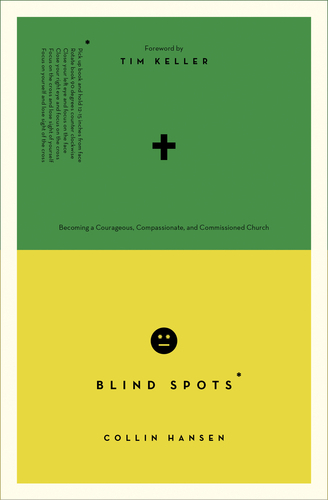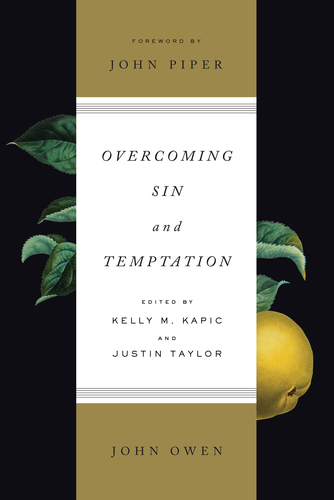Justin Taylor's Blog, page 79
April 23, 2015
If God Is Sovereign, Why Is My Sanctification So Slow?
If God is sovereign (and he is), and if our sanctification brings him glory (and it does), then why do we continue to struggle so much (which we do)?
For example, Christians know that communion with God in prayer, faith, and the Word will give us substantive joy. But we often cut it short or skip it all together for trifling things.
Writing to a correspondent in 1776, John Newton described it this way:
Though he knows that communion with God is his highest privilege, he too seldom finds it so; on the contrary, if duty, conscience, and necessity did not compel, he would leave the throne of grace unvisited from day to day.
He takes up the Bible, conscious that it is the fountain of life and true comfort; yet perhaps, while he is making the reflection, he feels a secret distaste, which prompts him to lay it down, and give him preference to a newspaper.
Newton then raises the sovereignty problem:
How can these things be, or why are they permitted? Since the Lord hates sin, teaches his people to hate it and cry against it, and has promised to hear their prayers, how is it that they go thus burdened? Surely, if he could not, or would not, over-rule evil for good, he would permit it to continue.
Newton’s answer is not to excuse spiritual dullness or laziness, nor to browbeat us, but to look up and beyond to see what God is doing through our sometimes painfully slow progress in the faith:
By these exercises he teaches us more truly to know and feel the utter depravity and corruption of our whole nature, that we are indeed defiled in every part.
His method of salvation is likewise hereby exceedingly endeared to us: we see that it is and must be of grace, wholly of grace; and that the Lord Jesus Christ, and his perfect righteousness, is and must be our all in all.
His power likewise, in maintaining his own work notwithstanding our infirmities, temptations, and enemies, is hereby displayed in the clearest light; his strength is manifested in our weakness.
Satan likewise is more remarkably disappointed and put to shame, when he finds bounds set to his rage and policy, beyond which he cannot pass; and that those in whom he finds so much to work upon, and over whom he so often prevails for a season, escape at last out of his hands. He casts them down, but they are raised again; he wounds them, but they are healed; he obtains his desire to sift them as wheat, but the prayer of their great Advocate prevails for the maintenance of their faith.
Farther, by what believers feel in themselves they learn by degrees how to warn, pity, and bear with others. A soft, patient, and compassionate spirit, and a readiness and skill in comforting those who are cast down, is not perhaps attainable in any other way.
And, lastly, I believe nothing more habitually reconciles a child of God to the thought of death, than the wearisomeness of this warfare. Death is unwelcome to nature;—but then, and not till then, the conflict will cease. Then we shall sin no more. The flesh, with all its attendant evils, will be laid in the grave. Then the soul, which has been partaker of a new and heavenly birth, shall be freed from every incumbrance, and stand perfect perfect in the Redeemer’s righteousness before God in glory.
Newton goes on to answer the question of how such sin can be mitigated or overcome. Here’s a summary of what he recommends:
Faithfulness to light received, and a sincere endeavor to conform to the means prescribed in the word of God, with an humble application to the Blood of sprinkling and the promised Spirit, will undoubtedly be answered by increasing measures of light, faith, strength, and comfort; and we shall know, if we follow on to know the Lord.
Newton was one of the the most spiritually healthy Christians in church history. You almost certainly will not regret any chance to read his counsel. The best introduction to his vision of the Christian life is now Tony Reinke’s Newton on the Christian Life: To Live Is Christ (Crossway, forthcoming in May).
April 17, 2015
Paul Was Inspired, Yet He Wanted Timothy to Bring Him Books to Read!
 Writing around AD 64-65, the Apostle Paul appended a request in his letter to his pastoral protégé and friend Timothy:
Writing around AD 64-65, the Apostle Paul appended a request in his letter to his pastoral protégé and friend Timothy:
When you come, bring the cloak that I left with Carpus at Troas, also the books, and above all the parchments. (2 Tim. 4:13)
Charles Spurgeon’s comments are worth reading about the implications for us today:
We do not know what the books were about, and we can only form some guess as to what the parchments were. Paul had a few books which were left, perhaps wrapped up in the cloak, and Timothy was to be careful to bring them. Even an apostle must read. . . . A man who comes up into the pulpit, professes to take his text on the spot, and talks any quantity of nonsense, is the idol of many. If he will speak without premeditation, or pretend to do so, and never produce what they call a dish of dead men’s brains—oh! that is the preacher. How rebuked are they by the apostle!
He is inspired, and yet he wants books!
He has been preaching at least for thirty years, and yet he wants books!
He had seen the Lord, and yet he wants books!
He had had a wider experience than most men, and yet he wants books!
He had been caught up into the third heaven, and had heard things which it was unlawful for a men to utter, yet he wants books!
He had written the major part of the New Testament, and yet he wants books!
The apostle says to Timothy and so he says to every preacher, “Give thyself unto reading.” The man who never reads will never be read; he who never quotes will never be quoted. He who will not use the thoughts of other men’s brains, proves that he has no brains of his own.
Brethren, what is true of ministers is true of all our people. You need to read. Renounce as much as you will all light literature, but study as much as possible sound theological works, especially the Puritanic writers, and expositions of the Bible. We are quite persuaded that the very best way for you to be spending your leisure, is to be either reading or praying. You may get much instruction from books which afterwards you may use as a true weapon in your Lord and Master’s service.
Paul cries, “Bring the books”—join in the cry.
A fortiori—tolle lege!
April 16, 2015
Tim Keller’s Foreword for Collin Hansen’s New Book, “Blind Spots”
Here is Tim Keller’s foreword for Collin Hansen’s new book, Blind Spots: Becoming a Courageous, Compassionate, and Commissioned Church (Crossway, 2015):
Jonathan Edwards was keenly interested in the philosophy and thought of his day, and at the same time he was fully committed to the absolute authority of the Scriptures. As a result he was, as Richard Lints put it, “arguably the most creative and the most orthodox theologian [at once] that America has ever produced.”
Edwards was also as deeply committed to sound, systematic biblical doctrine as he was fascinated by the workings of the heart and how the emotions and senses relate to our reason. This meant, “He stands with Augustine and Luther in the depth of his analysis of religious experience, [and] he stands with Aquinas and Calvin in the breadth of his intellectual grasp of the gospel.”
This breadth of interest is, however, extraordinarily hard to maintain. Historian Mark A. Noll demonstrates this in his essay “Jonathan Edwards and Nineteenth-Century Theology,” in which he traces out Edwards’s legacy in the American church over the hundred years or so after his death.
Old Princeton, including Charles Hodge and B. B. Warfield, were the most true to Edwards’s orthodox Reformed theology. However, not only were they “far from independent or original thinkers”; they were increasingly inattentive to matters of revival and spiritual experience.
Edwards’s New England disciples such as Samuel Hopkins, Jonathan Edwards Jr., and later Nathaniel Taylor were social activists, abolitionists, and creative theological thinkers, but they left behind much of Edwards’s biblically faithful doctrine.
So did Charles Finney, an enthusiastic reader of Edwards on revivals who strongly rejected his Reformed theology.
Noll’s essay demonstrates that there were some who maintained Edwards’s doctrinal orthodoxy, some who adopted his creative cultural engagement, and some who kept his enthusiasm for revivals and mission.
Ironically, each of these parties claiming Edwards as inspiration was hostile and critical toward the others during much of the early nineteenth century. Some theologians and ministers kept these various strands—doctrine, cultural engagement, and revival—interwoven and integrated, but that was not true of most.
You must not think by this foreword that Collin Hansen’s book is about church history or the historic schools of
American Reformed theology. It is not at all. Rather, it is an extended essay on how Christians in Western societies today are responding and how they need to respond to a culture quickly growing post-Christian. Christians have not come to consensus on how to respond to this new world.
Collin sees us fragmenting into at least three distinct responses, each with its own peculiar blind spots, and each one highly critical of the other two.
The three parties of Edwards’s followers correspond roughly to the groups that Collin discerns on the scene today.
This is evidence that these fissures within our ranks have been with us for a long time and that each party has latched
onto some true aspect of what it means to live the Christian life.
The “courage” group stands valiantly for the truth; the ”compassion” people stress service, listening, and engagement; while the “commissioned” folks are all about building up the church and reaching the lost.
Once things are broken down like that, it becomes clear that these should be strands in a single cord. Each group goes bad to the degree it distances itself from the others.
I am, of course, here making this much simpler than it is. Within the pages that follow, Collin Hansen judiciously weighs and discusses the complexities of where we are and what must be done.
You can find out more about this thoughtful and provocative book here.
April 13, 2015
The New ESV Bible App for iOS: Designed to Be the Most Intuitive and Elegantly Designed Bible App to Date
My colleagues at Crossway have invested an enormous amount of time into receiving and listening to feedback and seeking to design the all-new ESV Bible app to be the most beautiful and intuitive Bible app currently available.
It includes free resources such as personalized reading plans, audio streaming, and full access to the ESV Global Study Bible.
You can learn more at ESV.org/mobile. Here is a little video preview:
April 11, 2015
Livestream the TGC Conference for Free: Monday through Wednesday

Here is the schedule for the 2015 TGC conference (#tgc2015) free livestream, all times Eastern Daylight Time:
Monday, April 13
1:00 PM – Plenary 1: Tim Keller
2:30 PM – Plenary 2: John Piper
4:00 PM – Plenary 3: Don Carson
7:30 PM – Plenary 4: Augustus Nicodemus
Tuesday, April 14
8:30 AM – Plenary 5: Mark Dever
10:30 AM – Plenary 6: Panel Discussion
1:30 PM – Workshop 1: Tim Keller
3:00 PM – Workshop 2: Randy Alcorn
4:30 PM – Workshop 3: John Piper
6:00 PM – Seeking Justice and Mercy from Ferguson to New York
7:30 PM – Plenary 7: Voddie Baucham
9:00 PM – Shane & Shane (Sponsored by RTS)
Wednesday, April 15
9:00 AM – Plenary 8: Ligon Duncan
11:00 AM – Plenary 9: Phil Ryken
April 10, 2015
Free Livestream: 2015 Coalición por el Evangelio Pastoreando la Iglesia en el Siglo XXI 12-13 de Abril #TGC15
La iglesia hispanohablante se encuentra en lo que parece ser los inicios de un avivamiento. El Siglo XXI presenta oportunidades sin precedentes, y a la vez trae consigo sus propias dificultades. Tiempos como estos requieren una renovada confianza en el evangelio que de una vez para siempre fue dado a los santos, como está revelado en las Escrituras. A través de tres plenarias, tres paneles de discusión y un servicio de adoración en conjunto, en esta primera conferencia en español de The Gospel Coalition (Coalición por el Evangelio), estaremos animándonos unos a otros a que nuestros iglesias y ministerios tengan siempre en su norte a la persona de Jesús.
Domingo, 12 de Abril
2:00 PM (EDT)
Bienvenida oficial a la conferencia: Don Carson
2:30 PM
Plenaria: Predicando en el Siglo XXI: Sugel Michelén
4:00 PM
Panel de discusión: El rol de las alianzas por el evangelio en el Siglo XXI (Juan Sánchez, Miguel Núñez, Don Carson)
7:15 PM
Plenaria: La suficiencia de las Escrituras para el ministerio en el Siglo XXI: Don Carson
8:30 PM
Panel de discusión: Plantación de iglesias hispanas en el Siglo XXI (Juan Sánchez, Miguel Núñez, Félix Cabrera, David Sills, Tim Keller)
Lunes, 13 de Abril
9:30 AM
Plenaria: Liderazgo en el Siglo XXI: Dr. R. Albert Mohler
10:45 AM
Panel de discusión: El evangelio y los métodos evangelísticos en el Siglo XXI (Juan Sánchez, Miguel Núñez, Sugel Michelén, Mark Dever)
April 8, 2015
A Panel on Homosexuality and the Church
The highlights of this conversation for me were the last two exchanges: Kevin DeYoung’s answer on gay marriage (41:30-46:12) and Jackie Hill’s answer on what is the gospel (46:14-51:15):
April 6, 2015
The Missing Link in Our Culture’s Confusion about What Sexual Sin Is—And What to Do About It
It was only after I met my risen Lord that I ever felt shame in my sin, with my sexual attractions, and with my sexual history.
Conversion brought with it a train wreck of contradictory feelings, ranging from liberty to shame. Conversion also left me confused. While it was clear that God forbade sex outside of biblical marriage, it was not clear to me what I should do with the complex matrix of desires and attractions, sensibilities and senses of self that churned within and still defined me.
What is the sin of sexual transgression? The sex? The identity? How deep was repentance to go?
In these newfound struggles, a friend recommended that I read an old, seventeenth century theologian named John Owen, in a trio of his books (now brought together under the title Overcoming Sin and Temptation).
At first, I was offended to realize that what I called “who I am,” John Owen called “indwelling sin.” But I hung in there with him. Owen taught me that sin in the life of a believer manifests itself in three ways: distortion by original sin, distractionof actual day-to-day sin, and discouragement by the daily residence of indwelling sin.
Eventually, the concept of indwelling sin gave a window to see through how God intended to replace my shame with hope. Indeed, John Owen’s understanding of indwelling sin is the missing link in our current culture’s confusion about what sexual sin is — and what to do about it.
As believers, we lament with the Apostle Paul, “For I do not do the good I want, but the evil I do not want is what I keep on doing. Now if I do what I do not want, it is no longer I who do it, but sin that dwells in me” (Romans 7:19-20). But after we lament, what ought we to do? How ought we to think about sin that has become a daily part of our identity?
Rosaria goes to show that Owen explained his answer—the biblical answer—in four responses:
Starve It
Call Sin What It Is
Extinguish Indwelling Sin by Mortifying It
Cultivate Your New Life in Christ, Daily
You can read the whole thing here.
For more information on our edition of Owen’s classic trilogy on battling sin—in an unabridged version with outlines and notes and glossary—go here.
April 5, 2015
Watch This If You’ve Forgotten What It’s Like to Hear the Good News of Easter for the First Time
If you’ve never seen this old-school video about the moving EE-TAOW story, it is very much worth 25 minutes of your time to fan the flames for frontier missions where Christ is not yet named. Make sure to watch to the end.
He is risen—he is risen indeed!
March 31, 2015
Christian Films, Cultural Persecution, and Confirmation Bias
A point worth considering from Kenneth Morefield of Campbell University on the effect of Western Christian films using anecdotal evidence of cultural persecution in the academy:
It promotes a culture of fear and a culture of antagonism.
It reinforces the belief that those outside our circle are our enemies, to be battled, rather than our mission field, to be loved and evangelized.
To the extent it overstates our persecution, it pushes us to prioritize standing our ground and protecting our rights over being salt and light.
To the extent it fixates on archetypal stories of our victimization, it makes us quick to assume evil intent when we face conflicts and slow to acknowledge our own roles in perpetuating them.
You can read the whole thing here.
Justin Taylor's Blog
- Justin Taylor's profile
- 44 followers





